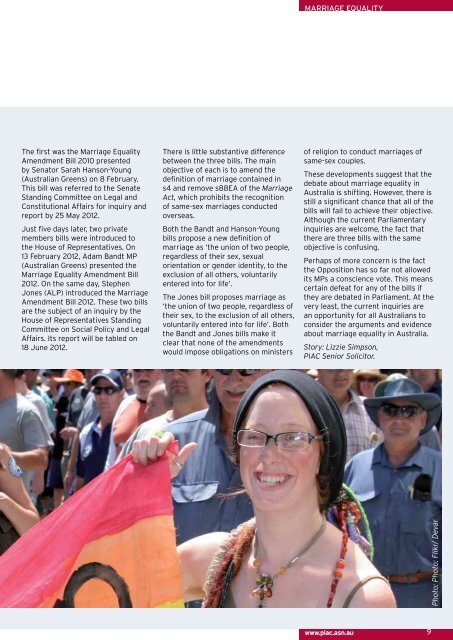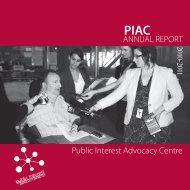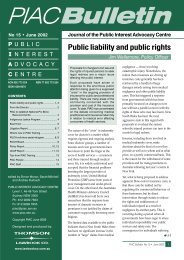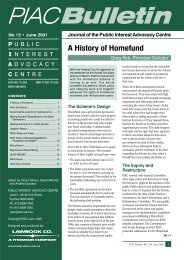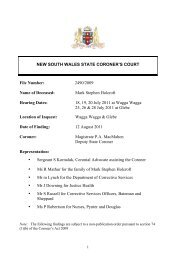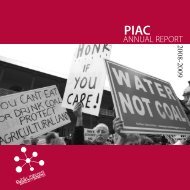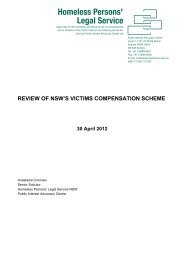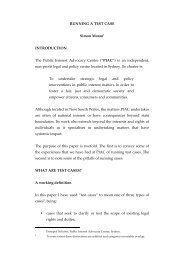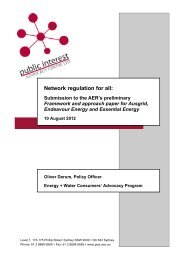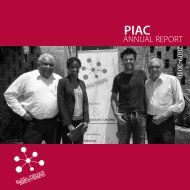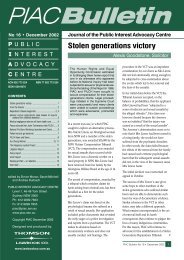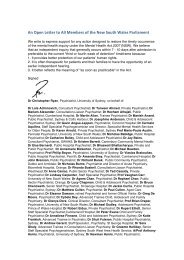PIAC Bulletin - Public Interest Advocacy Centre
PIAC Bulletin - Public Interest Advocacy Centre
PIAC Bulletin - Public Interest Advocacy Centre
You also want an ePaper? Increase the reach of your titles
YUMPU automatically turns print PDFs into web optimized ePapers that Google loves.
marriage equality<br />
The first was the Marriage Equality<br />
Amendment Bill 2010 presented<br />
by Senator Sarah Hanson-Young<br />
(Australian Greens) on 8 February.<br />
This bill was referred to the Senate<br />
Standing Committee on Legal and<br />
Constitutional Affairs for inquiry and<br />
report by 25 May 2012.<br />
Just five days later, two private<br />
members bills were introduced to<br />
the House of Representatives. On<br />
13 February 2012, Adam Bandt MP<br />
(Australian Greens) presented the<br />
Marriage Equality Amendment Bill<br />
2012. On the same day, Stephen<br />
Jones (ALP) introduced the Marriage<br />
Amendment Bill 2012. These two bills<br />
are the subject of an inquiry by the<br />
House of Representatives Standing<br />
Committee on Social Policy and Legal<br />
Affairs. Its report will be tabled on<br />
18 June 2012.<br />
There is little substantive difference<br />
between the three bills. The main<br />
objective of each is to amend the<br />
definition of marriage contained in<br />
s4 and remove s88EA of the Marriage<br />
Act, which prohibits the recognition<br />
of same-sex marriages conducted<br />
overseas.<br />
Both the Bandt and Hanson-Young<br />
bills propose a new definition of<br />
marriage as ‘the union of two people,<br />
regardless of their sex, sexual<br />
orientation or gender identity, to the<br />
exclusion of all others, voluntarily<br />
entered into for life’.<br />
The Jones bill proposes marriage as<br />
‘the union of two people, regardless of<br />
their sex, to the exclusion of all others,<br />
voluntarily entered into for life’. Both<br />
the Bandt and Jones bills make it<br />
clear that none of the amendments<br />
would impose obligations on ministers<br />
of religion to conduct marriages of<br />
same-sex couples.<br />
These developments suggest that the<br />
debate about marriage equality in<br />
Australia is shifting. However, there is<br />
still a significant chance that all of the<br />
bills will fail to achieve their objective.<br />
Although the current Parliamentary<br />
inquiries are welcome, the fact that<br />
there are three bills with the same<br />
objective is confusing.<br />
Perhaps of more concern is the fact<br />
the Opposition has so far not allowed<br />
its MPs a conscience vote. This means<br />
certain defeat for any of the bills if<br />
they are debated in Parliament. At the<br />
very least, the current inquiries are<br />
an opportunity for all Australians to<br />
consider the arguments and evidence<br />
about marriage equality in Australia.<br />
Story: Lizzie Simpson,<br />
<strong>PIAC</strong> Senior Solicitor.<br />
Photo: Photo: Flikr/ Devar<br />
www.piac.asn.au<br />
9


